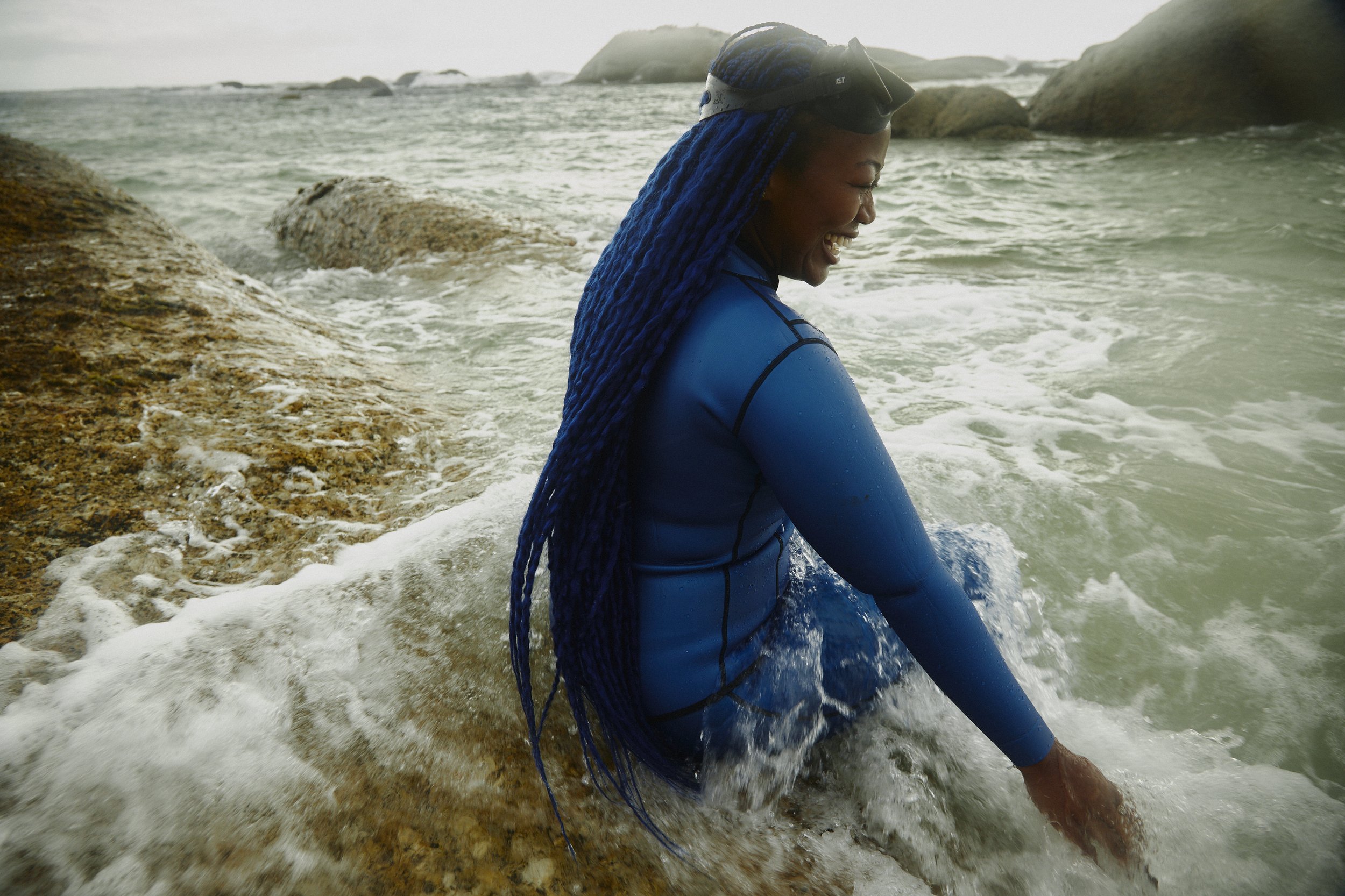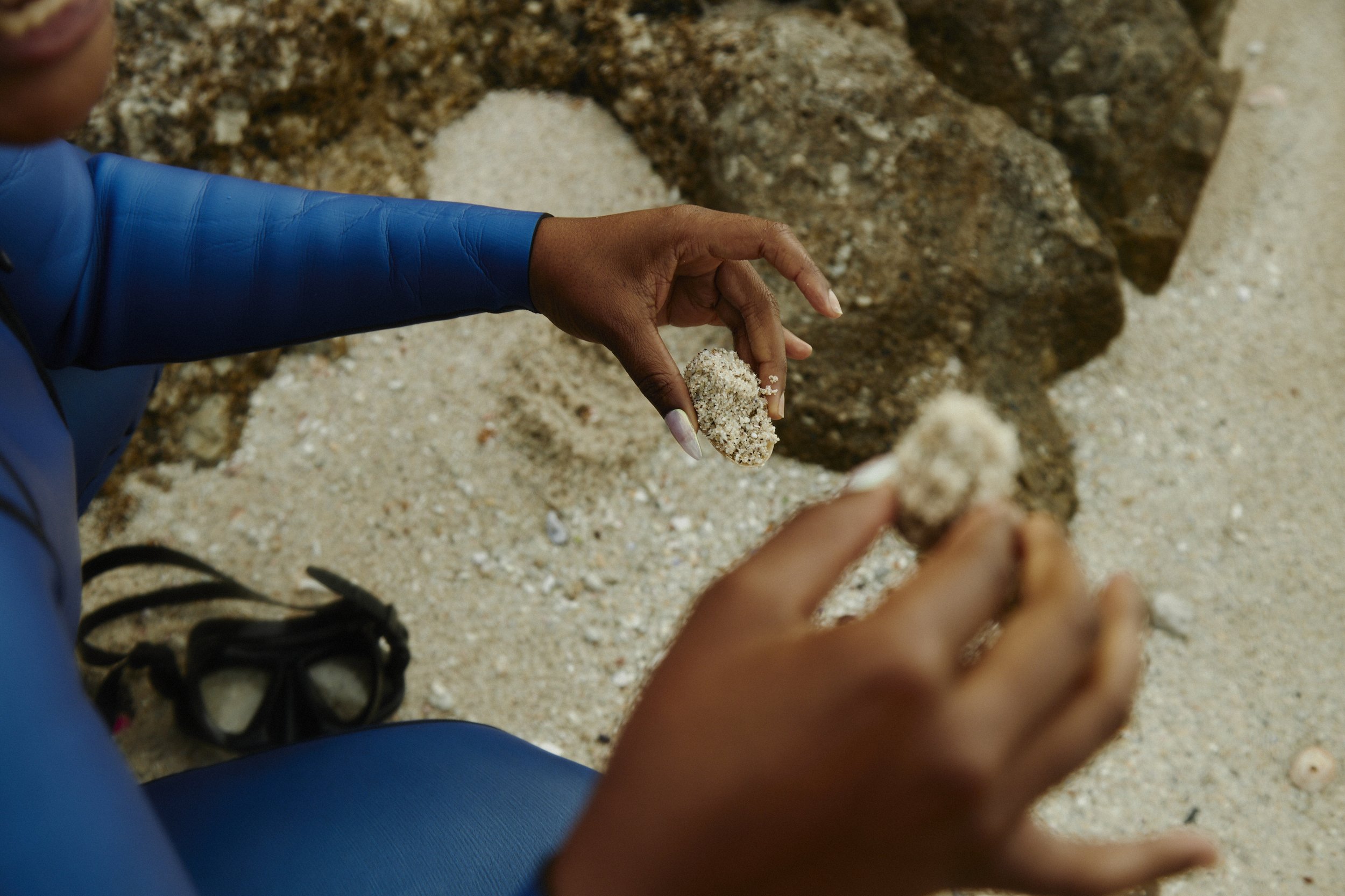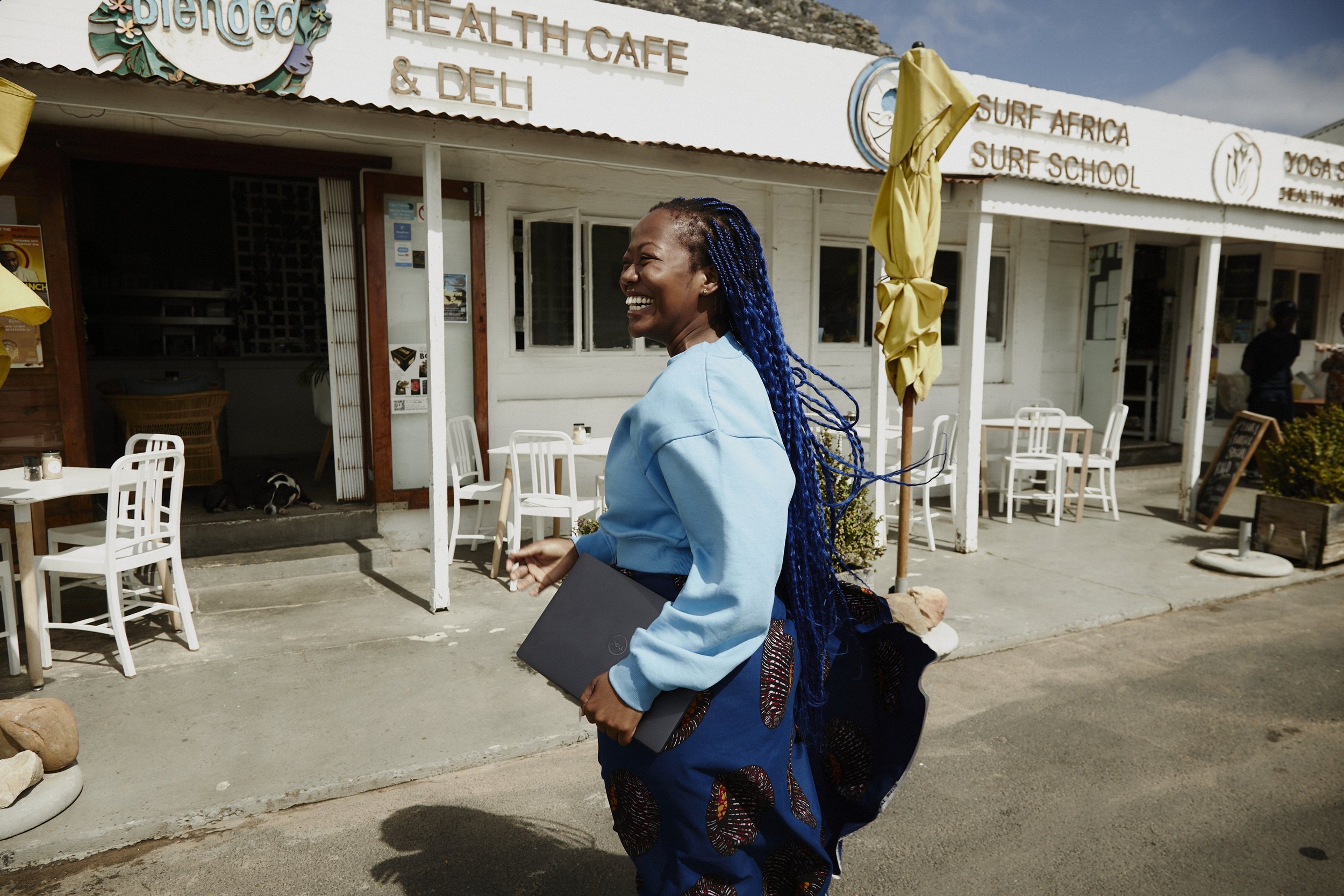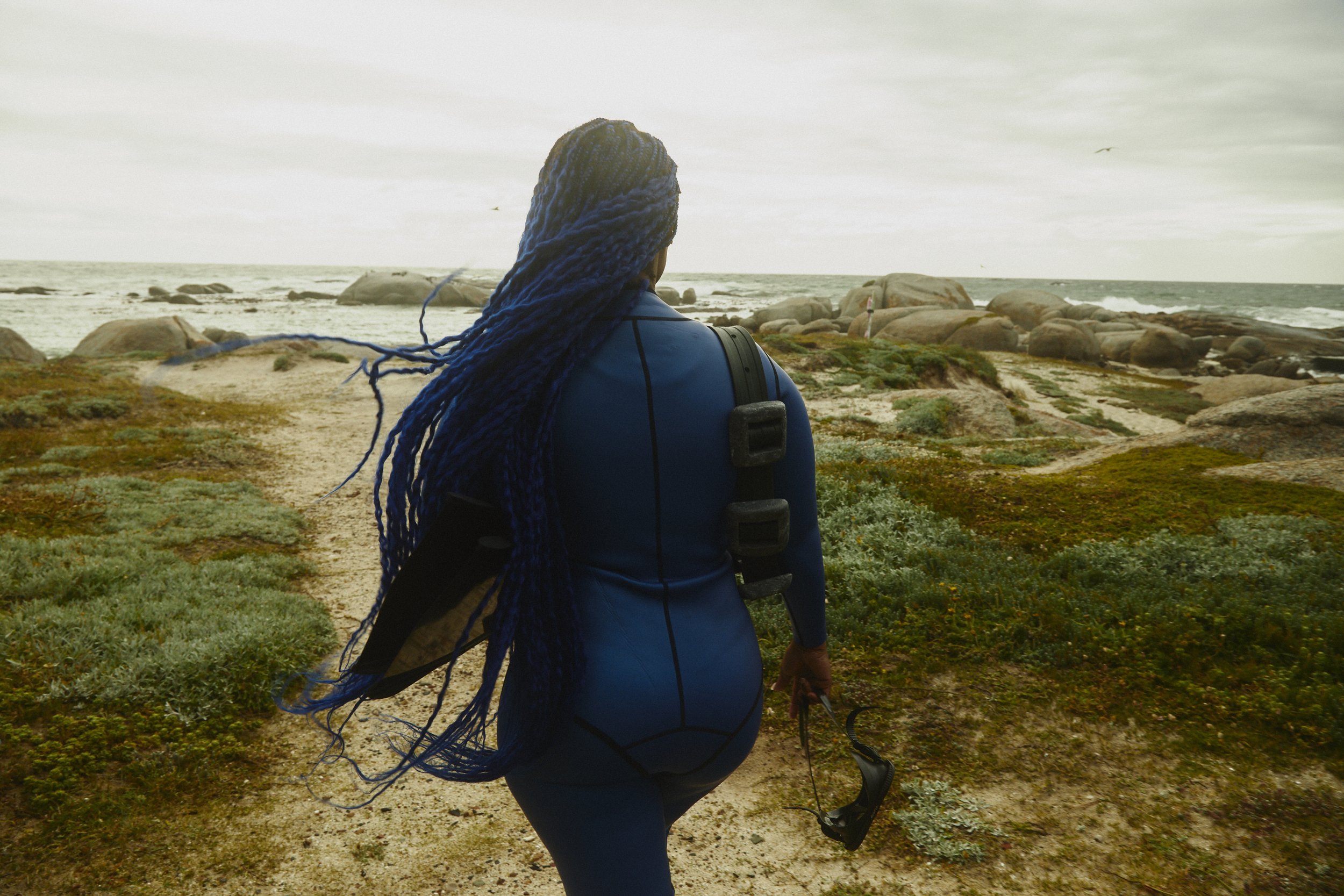‘We tell kids, this ocean is yours’
how South Africa’s ‘Black Mermaid’ inspires children to swim.
A snorkelling trip to Bali prompted Zandile Ndhlovu to set up a foundation that gives Black people access to the ocean and teaches them about the challenges it faces.
Shot on assignment for The Guardian Labs and Dell computers. Words by Emma Sheppard.
When Zandile Ndhlovu looked below the surface of the ocean for the first time, she was terrified. Then 28, she was on a snorkelling trip in Bali. “The captain told us to jump off the boat into the water, and I started freaking out when I realised I couldn’t touch the ground,” says Ndhlovu, who has since gone on to become South Africa’s first black female freediving instructor.
Eventually, she calmed down enough to enjoy the experience. “The blue was overwhelming. There were yellow fish moving through the honeycomb coral, which looked like it was lit up from above. It blew my mind. Something inside me opened up, it felt like home.”
Despite the country having thousands of miles of coastline, only one in seven South Africans know how to swim. During apartheid black children had less access to swimming pools. Drowning is the country’s second leading cause of accidental death (after road traffic accidents) with approximately four people drowning every day. Many are children and almost all of them are Black.
Ndhlovu grew up in Soweto, a landlocked township bordering the city of Johannesburg. She didn’t learn to swim as a small child and had never visited a swimming pool until she attended a multiracial school at 11. Swimming was considered “one of those white person things”, she says, and many Black children are told stories about how the ocean is haunted. “We did have access to a swimming pool in the area but it cost 50 cents (3p) and my mum never had the money,” she adds. Ndhlovu finally taught herself to swim at 15.
But as welcoming as the Black Mermaid – as she became known – found the ocean, the dive community wasn’t quite as inclusive. There were constant reminders that she was an outsider. “I was always the only Black person on dives. I’d be asked if I was going to dive ‘with all that hair’. My suits would never fit quite right – the top half would be too big and water would come rushing in. And everyone always spoke Afrikaans. I’d have to ask if we could speak English,” she says.
In 2020, Ndhlovu founded the Black Mermaid Foundation. “I started asking myself, what does it mean to create a safe space for Black people to be able to access the water, without needing to assimilate in order to fit in?” she says.
She started working with a community group in Langa, a township near Cape Town. Soon she was taking groups of children to the beach. They spent time in the ocean, learning to swim and snorkel, and finding out about the impact of plastic pollution on wildlife. Ndhlovu tells them stories about stuffing plastic rubbish down the sleeves of her wetsuit while out for a dive, or finding sharks and seals tangled up in fishing lines or stuck on abandoned fish hooks. “Every single time, we speak about the challenges the ocean is facing,” she says.
Many of the children are initially terrified of the water. “But then someone says: ‘There’s a starfish!’ And you see that terror turn from fear, to awe, to curiosity, to play. It’s been such an interesting journey. We’re telling these kids, this ocean, these waters belong to you too.”
Through collaborations such as Dell’s Welcome to Now campaign, she’s able to promote her foundation’s mission of creating access to ocean spaces, using technology and storytelling to communicate with a global audience.
Given Ndhlovu’s commitment to ocean conservation, it’s also fitting that Dell has pledged to make 100% of its packaging and 50% of its products from recycled or renewable materials by 2030. “We all need to do our part in this,” says Donnie Oliphant, general manager at Dell Technologies.
In 2017, Dell partnered with the non-profit Lonely Whale to launch NextWave Plastics, a consortium of global companies that aims to keep plastic in the economy and out of the ocean. Plastics that had been ocean-bound are collected, recycled and used in product innovations, and the group has diverted the equivalent of 2.27bn single-use water bottles to date. Packaging for some Dell XPS products is made from plastic collected from waterways and beaches.
The 13-inch XPS products have won more awards than any other in Dell’s history. Oliphant says it’s all about finding the optimum balance. “If I deliver the thinnest, or the lightest, or the most powerful thing, I’m typically going to have to compromise another trait that customers care about. So it’s a very delicate balance between delivering good performance, great battery life, and portability. It’s the harder path but we try to make all of those things as good as we can make them.”
Before Bali, she was working as a consultant specialising in diversity, inclusion and equality. Afterwards, she just wanted to be in the sea. She qualified as a scuba diving instructor and discovered freediving while browsing Instagram. “I hadn’t seen anything like it before. And from my first moment underwater, holding my breath, there was that feeling again – that feeling of home.”
She has ambitions to take the foundation global and this year held her first snorkel trip with a group of children in Rhode Island in the US as part of the Ocean Race Summit. One piece of kit helping her spread the word is her Dell XPS 13 Plus laptop, designed on the Intel Evo Platform and powered by Intel Core processors: “It’s tiny, light and easy to get around with. As someone who travels a lot, being able to have that technology at my fingertips is everything. I can respond to emails, draw up proposals, and edit my video footage after diving. It’s all so quick and easy.”
Ndhlovu has big dreams of her own. Since launching her foundation in 2020, she’s taken more than 200 kids to the beach and has plans to open the first “community ocean hub” (an education centre and meeting place) in Langa soon.
In the future, she wants to establish similar hubs all along the African coastline. “If we want to save our oceans, we need all hands on deck. We need to create the connection so that all people believe the ocean belongs to them too.”
And there is hope. One boy from Langa stands out in her mind. “It was one of our first times driving to the beach and everyone was sleeping. I asked him: ‘Aren’t you going to sleep?’ And he said: ‘No. When I grow up and have my own car, I want to remember how to get to where we’re going.’”




















